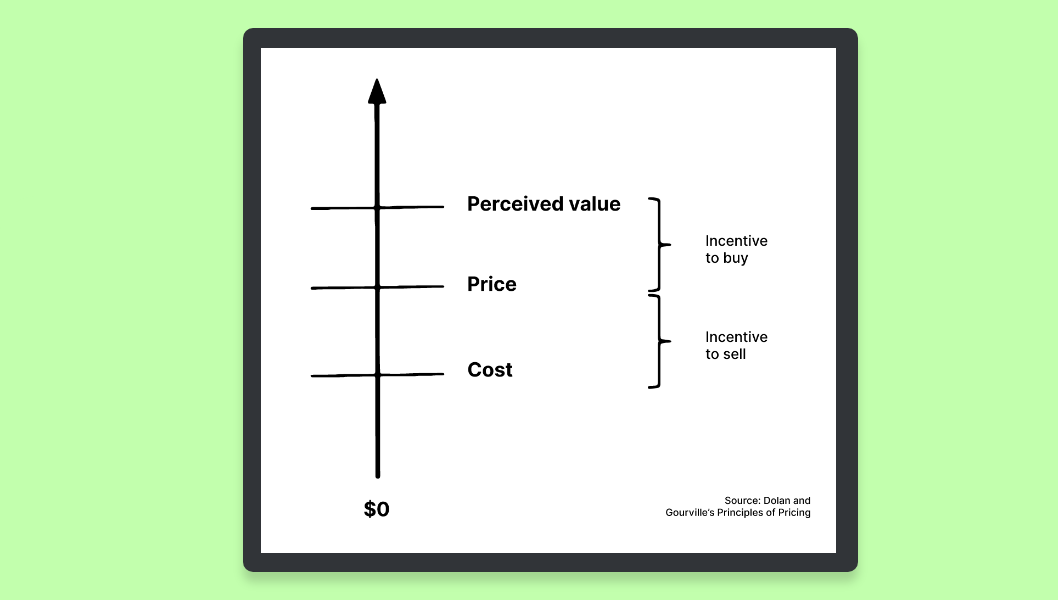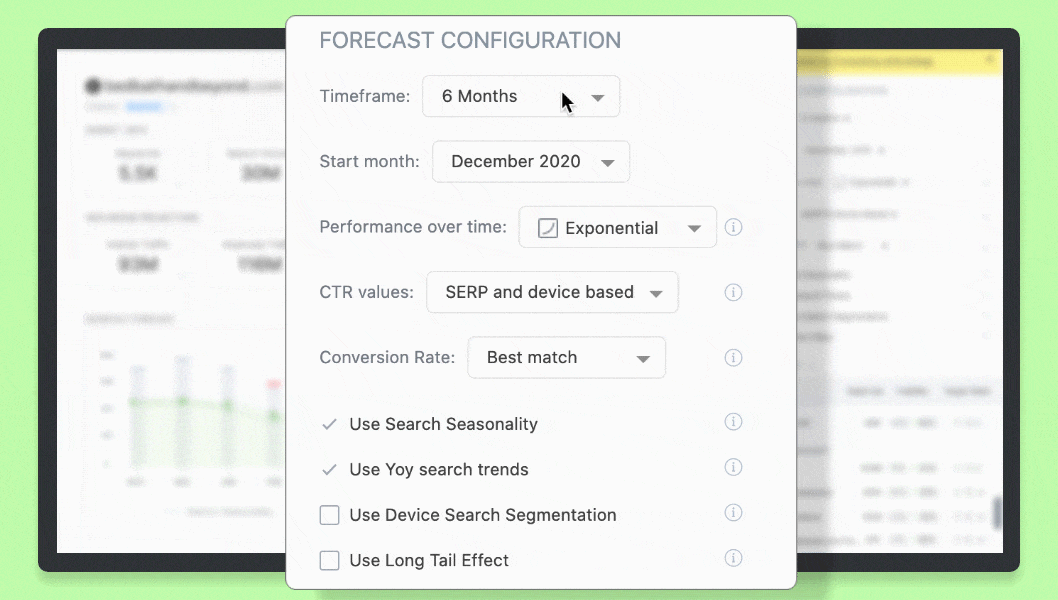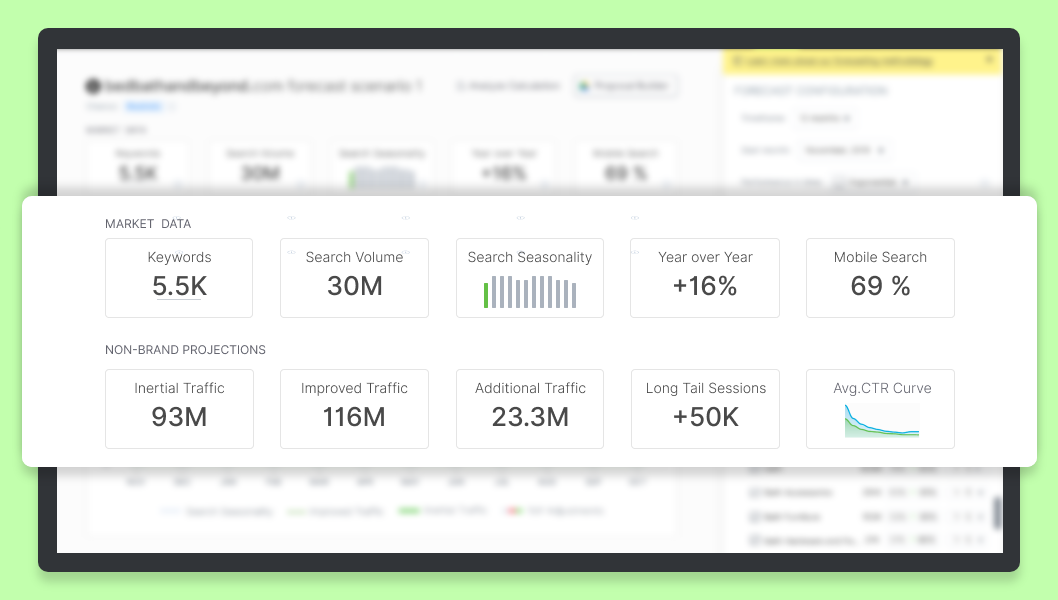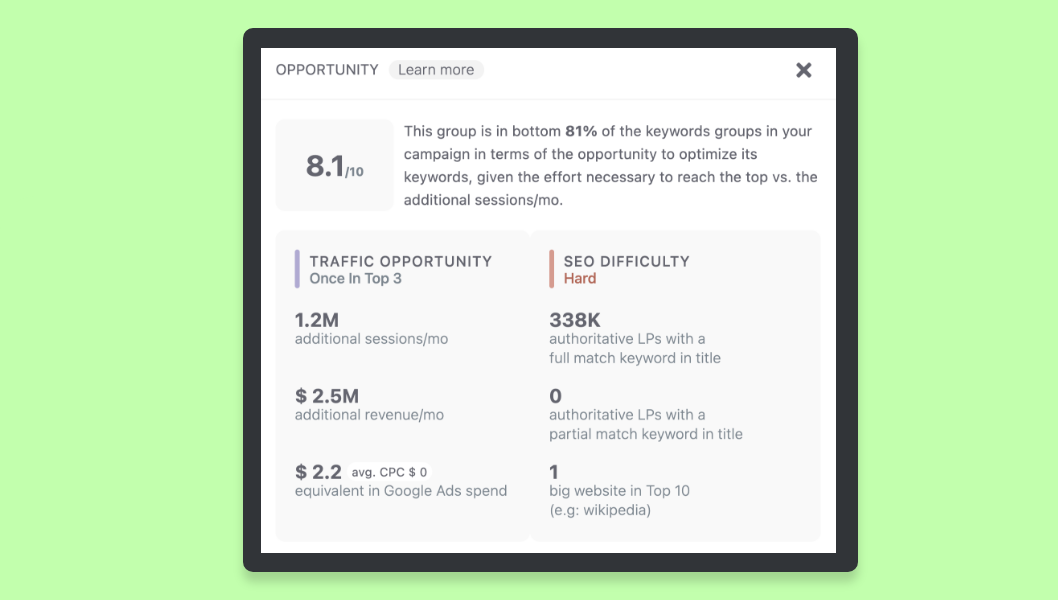Whether or not your agency’s pricing is on point is a pressing question when dealing with a potential client.
How many times have you found yourself thinking that you sold your agency short?
Or been anxious that the client won’t accept your fee?
Maybe you’ve been caught in endless and disappointing negotiations where the value was lost altogether.
Pricing feels like a black box. As markets continue to shift and SEO services diversify, setting a benchmark gets fuzzier and fuzzier.
But it doesn’t have to be that way.
After all, it all boils down to two important things – the right balance between a good profit for your agency and a good deal for your client.
What’s Behind the ‘Right Price’?
To determine what good profits and deals look like without the inherent subjectivity, you need to go back to the drawing board and analyze three important components: cost, price, and perceived value.
You also need to understand the relationship between them:
- Your incentive to sell is defined by the difference between cost and price – you don’t want to cover just your costs but make a profit.
- The client’s incentive to buy is defined by the difference between the perceived value of what you’re offering and the price – how your client perceives the value of your services informs their willingness to buy them.

Get too close to the operational costs with your pricing, and you’ll lose the motivation to make that sale.
Get too far out into the perceived value with your pricing, and you might lose the client if they perceive the agency as too costly.
It’s a balancing act to determine the sweet spot for your price, between the cost and the perceived value.
It’s also a question of who gets the most value out of your agency services, so as to create a relevant threshold, and how to create a data-driven benchmark to determine the most effective margin with available search data.
Let’s take them one by one.
Get too close to the operational costs with your pricing, and you’ll lose the motivation to make that sale. Get too far out into the perceived value with your pricing, and you might lose the client, who perceives the agency as too costly.
The Customer Segment Makes a Difference
Your SEO agency’s DNA will inform how you determine your client segments, whether based on geographies, size, or industry.
Also, according to the range of services you offer, you’ll know what clients don’t suit your needs – for instance, an early-stage startup won’t be a good SEO client for various reasons (lack of product-market fit, lack of budget, no SEO foundations to begin with etc.).
Furthermore, think about the difference in creating SEO value for a startup and an established ecommerce company with a few technical issues.
You can use a strategic tool like the business model canvas to start mapping your current client portfolio and determine who’s your ideal client profile, answering questions like:
- Who are the customers?
- Where are they in their growth stage?
- What are their revenue streams?
Maybe you specialize in a specific vertical like medical SEO, lawyers SEO, B2B SaaS etc. Or perhaps you’re interested in focusing on online businesses only or enterprise only.
It’s also crucial to look into your agency’s history and analyze your failures in selecting clients and projects. You’ll remember the bad deals and the misaligned offers – map them and learn from them:
- How were your profit margins for each one of them?
- How many hours did you spend?
- What other resources did you use?
- What was the monthly recurring revenue?
- How did all of the above affect your income?
Knowing who to refuse to secure specific pricing and not destabilize your policy is just as important as identifying your preferred client segment. That way, you don’t start negotiating from scratch every time a potential client contacts you.
After all, if it’s not a qualified lead, you must say no.
Articulate the (Perceived) Value & Forecast It
After figuring out what clients you want to work with (those who make sense from a pricing point of view), you need a straightforward process to help them understand your value.
Even if you know your gross margin (the gap between your costs and your potential pricing) and your lead qualification principles, you must evaluate a rather uncertain input to make the formula complete – the perceived value of your agency’s services.
There are many possible variables in your qualified lead’s head: your brand, your referrals, other players in the market, other offers received, their history with other vendors, etc.
It’s hard to take all of them into account and it’s a slippery road, anyway.
It’s more efficient to establish a data-driven process through a reliable forecasting methodology. It will make a difference in your positioning and help you be transparent and trustworthy while bypassing the subjectivity inherent to perception.
Translate SEO Results to Business Outcomes
In order to determine the relevant inputs that will impact the client’s business, you need to take into account:
- The non-brand organic traffic that you can directly impact through the SEO campaign.
- Search seasonality and the year-over-year trend of your targeted keywords.
- The inertial traffic influenced by seasonality only (as if the website’s rankings would stand still).
- The performance in time towards the visibility improvement target, whether linear or exponential.
- The average CTR curve for the top 10 positions, for each mix of SERP features and device split, showing you the actual clicks that manage to reach your client.
All of the above data will allow you to estimate results in terms of clicks and conversions instead of rankings, thus making a closer connection between your proposed SEO strategy and their potential business outcomes.
Moreover, you’ll be able to highlight the difference in traffic with and without your proposed SEO campaign. This means you’ll also be able to calculate what the equivalent in PPC looks like – an objective number to anchor the price in.
Bringing in this external comparison will show the worth SEO brings, giving clients a chance to research and assess the projected outcome with a clear context in mind.
Set the Right Price
With this equivalent at hand, you’ll not only create a trustworthy pitch, but you’ll also know the perceived value benchmark. Plus, you’ll be transparent from A to Z, an added value in terms of client relationship building.
Let’s say you have a client whose estimated Google Ads Value is $875,000 for the 12 months forecasted scenario. A $10,000 retainer may not sound as far-fetched anymore, considering this client must be a player in a highly competitive international market and the added conversions you can generate are no small feat.
Or maybe it’s a client with a $63,000 estimated Google Ads Value for the 12 months timeframe. Then, a $500-700 retainer seems more plausible – it’s probably an SMB within limited geography, needing help to raise the bar in their market.
No matter the client profile you want to serve at your agency, with this efficient use of search data you’ll be able to create realistic business scenarios that help dictate your pricing without the painful guesstimations.
Once again, you can make the point that SEO is an investment and the traffic you’re generating for the client is there to stay. There is a cumulative value that goes beyond the paid media results if you think long-term.
Plus, for accountability purposes, you can go one step further and set your SEO objectives following the forecasting benchmarks, thus having a reliable starting point to measure against.
Monthly Retainers. One-Time Projects. Success Fees.
Considering the agency business model and that SEO is a long-term investment, the monthly recurring revenue (MRR) is the pricing that makes the most sense.
But the question of one-time projects will appear – should you or shouldn’t you accept them?
As with any clarification process, it depends on how your defined pricing policy integrates exceptions.
Sometimes, accepting a one-time deal can bring benefits if you consider:
- Technical audits as a separate service.
- Consultancy services.
- SEO training.
It can also work if you feel there’s a distinct benefit to be gained.
Maybe it’s a new vertical you want to enter, or an experimental project your agency wants to explore. In these cases, you can agree on a 3-month project and set the expectations accordingly – no rigid results, but an experimental setup to pinpoint SEO potential.
Of course, this can be a starting strategy that leads to next steps, should the initial results be promising.
When evaluating such leads, it’s good to do your preliminary keyword research with the “low-hanging fruit” lens and spot the SEO opportunities early on. For instance, evaluating the targeted keywords’ difficulty or the additional traffic generated if those keywords reach the top 3 will give you a good idea about your client’s market and your potential ROI.
Another added value for your SEO offers is the success fee. You should do it every time you start a collaboration. You’ll not only communicate confidence from the get-go, but you’ll add an extra layer of motivation for your team to deliver beyond the agreed-upon results.
Do We Consider Competition?
The right price is mainly influenced by your costs, your profit margins, and your client profile. Yet, you should be aware of your agency’s competitors and their pricing policies, in order to see if they anchored the perceived value on a different scale.
If you find yourself on a different level than what the market is accustomed to, your positioning and perceived value play a major role in the final decision.
In business theory, this approach to pricing is called the value-based approach.
In an HBR article, A Quick Guide to Value-Based Pricing, you’ll find the following definition:
“Value-based pricing is the method of setting a price by which a company calculates and tries to earn the differentiated worth of its product for a particular customer segment when compared to its competitor.”
Now, with all of the inputs at hand, you’ll know how to set and explain the differentiated worth of your agency.
Summary
Creating a pricing strategy that resonates with your agency’s business model can be a tough endeavor.
Analyzing cost, price, and perceived value, you get to think about all the components that keep the balance between your incentive to sell and the client’s incentive to buy:
- The cost structure of your agency.
- The customer segments that you want to cater to.
- The customer profiles to whom you’ll say no.
- The perceived value of your SEO services, calculated through a reliable and transparent forecasting method (making the case for the additional visits and conversions you can bring and how that might look in a PPC campaign by comparison).
SEOmonitor’s forecasting module highlights the Google Ads value equivalent, letting you see all the calculations down to a keyword’s level, for the sake of a transparent and valuable pricing decision (which you can present to your clients).
This is just one of the many solutions we’ve developed to help SEO agencies acquire, manage, and retain more customers.
Join us in our journey to bring more transparency to the SEO industry.
Create a data-driven
price model with reliable search data!
The opinions expressed in this article are the sponsor's own.






